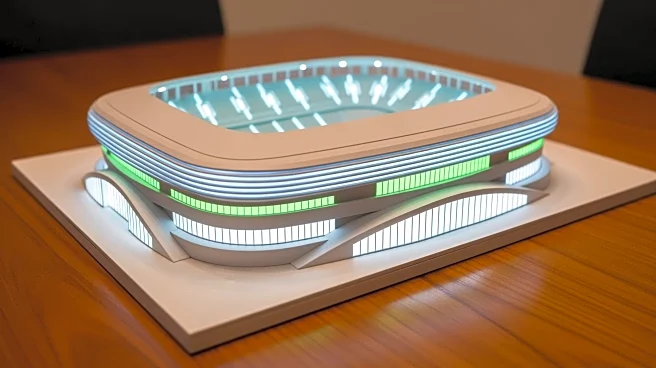What's Happening?
Plans for a new 5,000-seat indoor sports arena in West Yorkshire are under discussion by council leaders. The proposed venue aims to host professional basketball, netball, and ice hockey, with profits
reinvested into grassroots sports facilities across the region. A feasibility study has recommended Leeds as the preferred location due to its large catchment area and status as the largest corporate market in the region. The arena is estimated to cost between £48m and £57m to build. The study, approved by West Yorkshire Mayor Tracy Brabin, highlights the potential social and economic benefits of the arena, which could provide a significant boost to local sports infrastructure.
Why It's Important?
The development of a new sports arena in West Yorkshire could have significant implications for local sports and community engagement. By providing a venue for professional sports, the arena could attract more visitors and investment to the region, enhancing its economic profile. Additionally, reinvesting profits into grassroots sports facilities could foster greater participation in sports among young people, promoting health and community cohesion. The arena could also serve as a model for similar projects in other regions, demonstrating the potential benefits of investing in sports infrastructure.
What's Next?
The West Yorkshire Combined Authority will continue to evaluate the feasibility of the project, considering potential competition from other local authorities. If approved, the next steps would involve securing funding and finalizing the location. The project could face challenges in balancing the projected earnings with the construction costs, necessitating additional funding sources. Stakeholders, including local sports clubs and community groups, may play a role in advocating for the arena and ensuring its benefits are realized.
Beyond the Headlines
The proposed arena could influence the cultural landscape of West Yorkshire by elevating the status of sports like basketball and netball, which currently receive less funding compared to other sports. The project highlights the importance of equitable access to sports facilities and the role of infrastructure in promoting diversity and inclusion in sports. Long-term, the arena could contribute to a shift in regional sports priorities, encouraging more investment in sports that appeal to a broad demographic.









